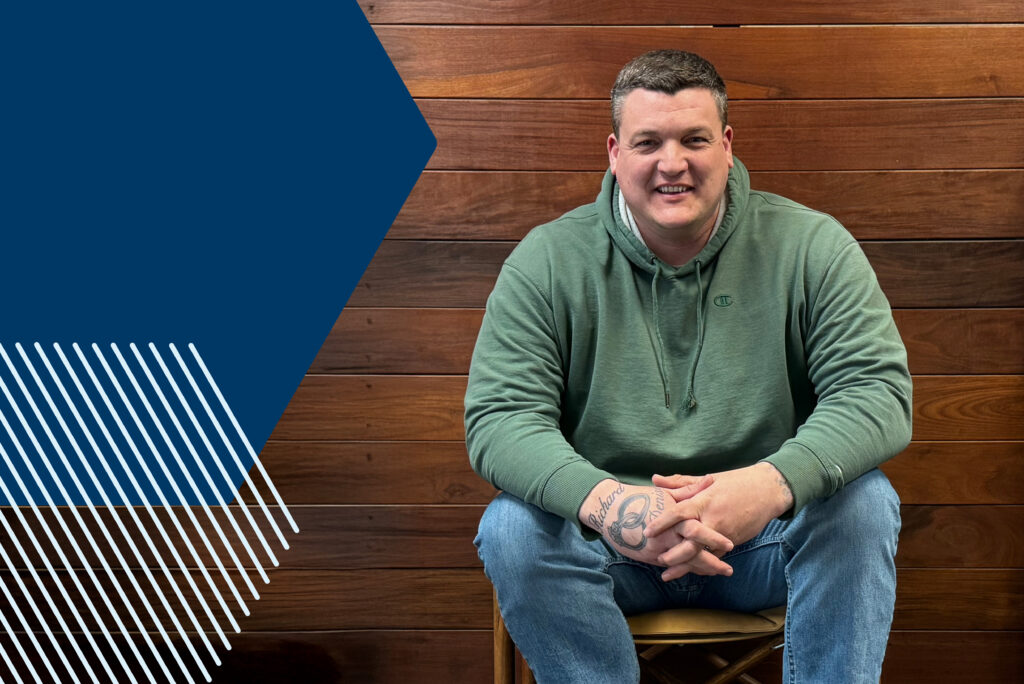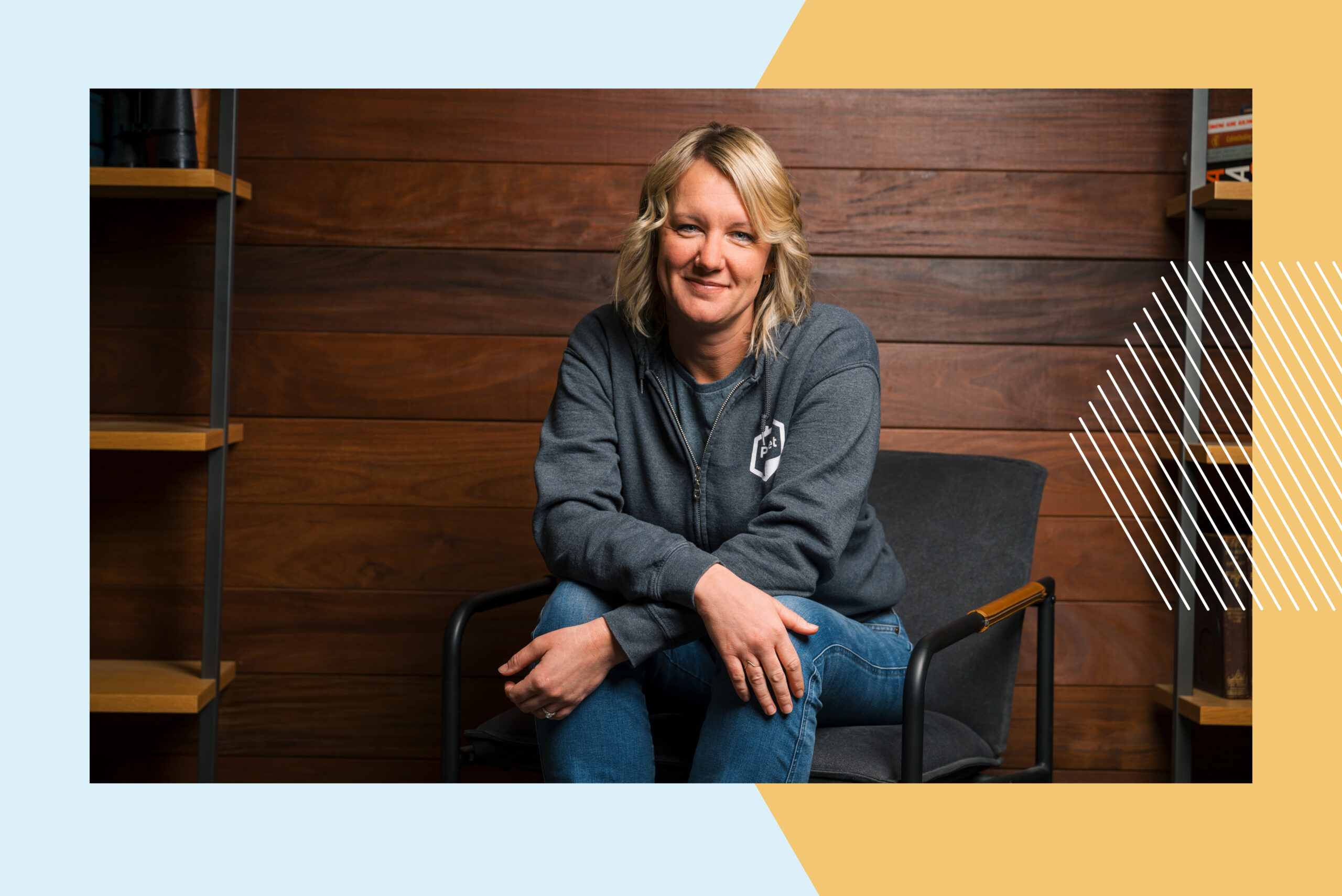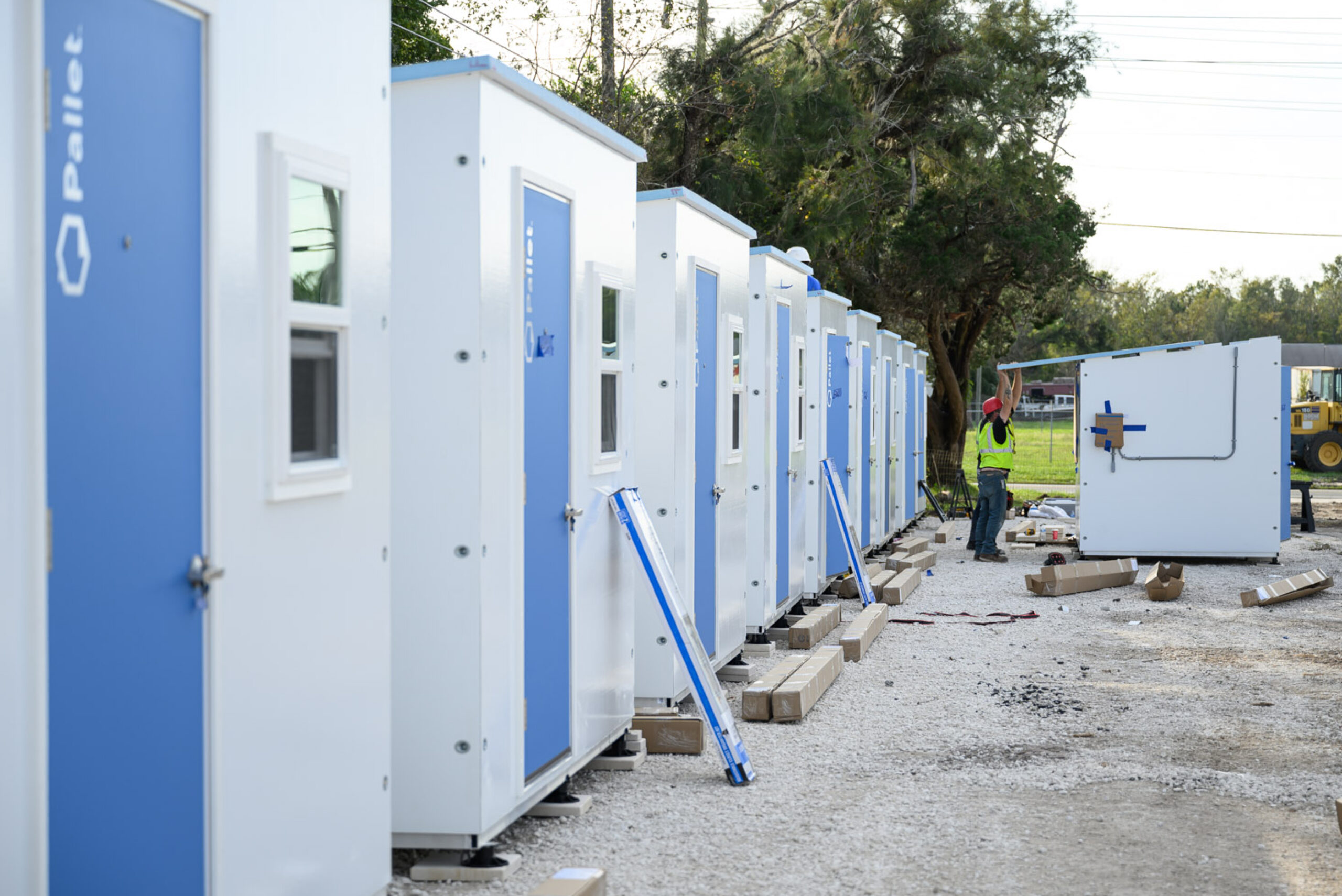Richard: Moving forward with purpose
February 18, 2025
After spending much of his life in prison, Richard is now focused on helping others and continuing on the path of self-improvement.

Thumbing through a thick stack of certificates spanning from graphic design to dog training to a Lean Six Sigma Black Belt, it’s natural to be impressed by everything Richard has accomplished. What might not be obvious are the dark times he’s lived through, and that if it weren’t for some words of forgiveness and encouragement at a pivotal moment in his life, he may not be here today.
Richard’s childhood was tumultuous. Born in West Covina, CA, he spent his early years there before moving to Montana for a short stint with his mother and stepfather. It was there that Richard’s stepfather attempted to murder him.
“My stepdad was extremely abusive,” he recalls. “One day when I was seven, he tried to kill me. Left me for dead. My mom found me in the snow, bleeding.”
After being rescued, Richard was taken back to California and placed in a foster home. His mom was using substances at the time, and his siblings were all taken from her care. She regained custody when Richard was 14 and moved the family to northeast Washington state, but after getting in various fights and having general feelings of restlessness, he wanted to get away from it all. He made his way back to California on his own.
“I just got burned out, and I felt like I’d rather live on the streets,” he says. “I’d rather be away from everybody.”
From 14 to 18, Richard lived on the streets of Hollywood and on Venice Beach, intermittently visiting his mom in Washington for brief periods. During this time, he served time in juvenile hall and then Los Angeles County Jail for grand theft auto. He was on the wrong track with the wrong crowd, and he was aware of it. He left LA, thinking that being near his mom and brother in eastern Washington would improve his situation.
“You can leave wherever you want to leave, but if your personality stays the same, it's not going to change much, right?” he quips. “So I came up here, I started stealing cars, getting in trouble. I want to say normal kid stuff, but I know it's not normal kid stuff. But in the environment and the people I grew up around, that was kind of normal kid stuff.”
One night in July of 1999, Richard was hanging out at a park with a group of friends. Richard ended up agreeing to help steal a car with a few other people. It quickly became clear that the instigator in this escapade, a person several years older than his peers and someone Richard wasn’t well-acquainted with, had other plans.
He pulled out a gun and suddenly shot one of the other kids that came along. He then turned to Richard.
“He basically gave me a choice,” he says. “He had two guns on him, and he handed me one. I'm lost at this point. He says to me: ‘Hey, you're either involved or you're not. And you want to be involved.’”
Richard’s choice—to be involved—changed his life forever.
Wracked with guilt, Richard turned himself in. In Washington state, every suspect complicit in first-degree murder receives the same charges and penalties, regardless of if they’re considered the main perpetrator or an accomplice. He testified against the shooter while confessing to his involvement, accepting a minimum of 25 years in prison. Richard asked for 40.
“I was really messed up in my head,” he explains. “I guess I felt like, ‘Why didn't I stop it?’”
The victim’s family, present for the trial, heard Richard’s story. They saw his remorse and knew that it wasn’t his intention to harm anyone. Two of the victim’s uncles and his grandma even wrote letters requesting leniency for Richard, but it didn’t impact his sentence.
Several years after entering prison, Richard began to feel exhausted by the violence and chaos surrounding him. Whether he was involved in a fight or witnessing one, he became aware of how numb he felt.
He remembers the hopelessness he felt one particular instance after being released from solitary confinement: “I just broke down crying. Prison was breaking me. It was turning me into this animal, and I just didn't care anymore. It was ringing in my head: ‘I'm getting institutionalized. If I keep going on this route, I will spend the rest of my life in prison.’ There's no doubt.”
Richard said he saw three paths out of how he was feeling. The first: “I go down the route of being a monster, and I just become something I don't wanna be. Like something you see on TV, these guys in prison that spend their lives there.” The second was to find a way to go straight and become the person he was supposed to be. The final option was to take his own life.
Richard made the decision to take the third path. When the ER called his mom initially, they told her he had passed away, only to have to call back and inform her that he was still alive. He received a blood transfusion due to the large volume he had lost. For two weeks, Richard was confined to a bed and could barely move.
His recovery was slow. But a few weeks after coming to, Richard received something that would change his perspective and define his future: a letter from the victim’s grandmother.
He paraphrases its contents: “None of us want this. We want you to go on, we want you to live your life, we want you to live for him. I want you to promise me you'll never do that again. And in the process, I want you to promise me that you'll always try to help everybody else.”
This was when everything began to change. Richard vowed to cut ties with the violent groups he was involved with. At meals, he started to sit with people who were working on their degrees. He decided he wanted to make progress, too.
At that point, Richard had too many years remaining on his sentence to pursue his associate’s degree—prison policy operates on the assumption that if an inmate still has a long time to serve, they won’t retain the knowledge after being released. So, he began writing kites (internal requests to prison administration) to the Dean of Education.
They denied his request. Richard kept writing.
He started with one kite every six months, which they continually denied. Then he moved to sending them once a week for three more months, getting the same result. When he shifted to twice a week, the custody unit supervisor called Richard into their office, asking, “Are you ever going to stop writing these?” He assured them that he wouldn’t until they gave him a chance.
While they didn’t allow him to pursue his associate’s, Richard was permitted to take a graphic design course. Having a knack for painting and tattooing already, he obliged and obtained the degree after a year of coursework. Before he was even finished, he put another bug in the lieutenant’s ear about his associate’s degree.

Witnessing how serious Richard was about continuing his education, the request was run up to the superintendent, who eventually obliged on one condition: “You are the forefront. If you work out, we'll start giving it to other people with longer sentences. So you mess it up, you mess it up for them. You do well, then we'll consider them.”
To no great surprise, Richard completed the degree and only wanted to accomplish more. Unfortunately, the prison didn’t offer a bachelor’s program, which was his next goal.
“From that point on, I was just getting certificates in everything and anything you could think of,” he explains.
Instead, the administration recruited him to be a teaching assistant for inmates obtaining their GEDs. He then created a Release Readiness program for anyone wanting to prepare themselves for life after prison, regardless of sentence length—an unconventional idea, as most analogous programs are offered only to inmates with less than a year left to serve. After that, he was scouted to be part of the dog training program, becoming the de facto head puppy trainer after a couple years.
After several years of doing everything he could to help others and further his education, a friend told him to contact the attorneys at Seattle Clemency Project. He believed Richard would be a good candidate to apply for clemency, something he hadn’t even considered as an option.
“I'm literally sitting with people and helping them get their GEDs, helping them figure out college, helping people go to the law library, trying to help them get out and doing all that stuff,” he explains. “And I never even once thought about filing for clemency. It never crossed my mind, because at this point, I had a flat 25-year sentence.”
In their initial meeting, the attorneys quickly took a liking to Richard. Even though the chances of getting past the first phases of the clemency process are slim, let alone getting released after the hearing, they encouraged him to try. They told him it was going to be difficult, but they believed he had demonstrated that he was ready to be released from prison.
Richard spent the next year preparing for his clemency hearing, knowing that he had a chance if he could prove his honesty and humility. When the big day arrived and it came time to give his statement, which he had carefully prepared, he opted to set the paper down and just speak from the heart.
“I did this statement that was like 10 minutes long, and I didn’t read anything,” he remembers. “It just flowed.”
The result of the hearing was a unanimous decision to grant Richard clemency. The next step is securing the governor’s approval of the decision, which normally goes smoothly and without opposition. Which is why it was extremely unusual when Governor Inslee denied Richard’s case along with three other candidates that were also granted approval.
Richard was crestfallen but knew that he did all that he could and was still on the right track. For the next two years, he continued to hold his head high. He took art and music courses. He spent time talking to his then girlfriend on the phone, now his wife.
Then one day, out of the blue, he was told he had a call from the attorneys who worked on his clemency case. They informed Richard that Governor Inslee reversed his decision. What’s more, he overrode the typical step of scheduling another hearing to approve the release—an unprecedented decision.
Richard was dumbfounded: “I remember being like, ‘No way, this is not a real thing. This is a joke.’”
But on July 31st of 2021, as he walked out the prison doors to his girlfriend waiting for him and piled into the car with her son and her Chihuahua, reality set in.

Friends and family told him to take a few months to relax. But in true Richard fashion, he started a carpentry job the following week.
While searching job boards for better opportunities, he came across Pallet. He was intrigued when he learned about the emphasis on fair chance employment. As he worked his way up to higher earning positions in the construction industry and spent some time doing grassroots advocacy work, he waited for a position at Pallet to become available. When it did and he was offered a job, he readily accepted.
“I like what Pallet does,” he says. “They help everybody out. They don't care who they're helping, as long as they're helping somebody. That's kind of where I'm at in my life.”
These days, Richard works on the Pallet team as an Engineering Technician. Having already earned his Lean Six Sigma Black Belt, he hopes to apply his knowledge and continue progressing in the field by earning his bachelor’s degree in either engineering or operations management.
With everything he’s endured and experienced in his life, Richard has learned a lot. He shares two of his guiding lights: first, do everything with a purpose; second, learn to accept change, even if it seems daunting.
“If something changes, I'm not so scared of it that I'm not willing to go through it. I just learn to flow and keep going, and I find another way. If it's progress, that's the good change. If my road washes out, I hike around it. If my base falls down, I build another one. It doesn't matter. If someone throws something in front of me, I just walk around it or step over it. So that's how it will always be. That's where I'm at.”


